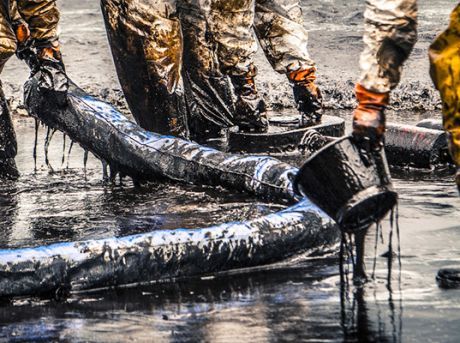Features
You are here
Trudeau’s Trans Mountain pipeline: the cost of a spill

June 26, 2018
The Canadian Federal Government has committed to buying the existing Kinder Morgan Trans Mountain Pipeline, and paying for its expansion. This has an estimated cost of just under $12 billion. However, even once the pipeline is constructed, the pipeline will continue to spill, irreparably damaging the environment and costing the local governments billions.
Spills
Since the 1960's, Kinder Morgan has had a spill approximately every four years. In the past fifteen years, Kinder Morgan has had five major spills of crude oil along British Columbia's Southern Coast alone. As the Tsleil-Waututh Nation summarized:
· July 15, 2005, Sumas Tank Farm spilled 210 000 liters.
· June 4, 2007, Wahleach pump station spilled 69 950 liters.
· July 24, 2007, the pipeline in Burnaby spilled 250 000 liters.
· May 6, 2009, Kinder Morgan's oil storage facility in Burnaby spilled an estimated 200 000 liters.
· January 24, 2012, Kinder Morgan's storage facility on Sumas Moutain spilled an estimated 110 000 liters.
In addition to these major spills there has been, like every pipeline, a series of minor spills. On May 27, two days before Trudeau announced the government’s pipeline purchase, Kinder Morgan announced another 100 litres spilled in Kamloops.
Kinder Morgan has had spills in the past, and the new pipeline being built will spill in the near future. Though it is impossible to know exactly what an oil spill will cost to clean, assessments have been made based on previous spill clean ups in the past.
Economic and ecological costs
In 2012, the Fisheries Centre of the University of British Columbia conducted a study on the potential impact of a tanker spill on ocean-based industries in British Columbia. Along the North Coast of British Columbia, it estimates a medium-sized oil spill would cost the regional economy up to $189 million, requiring an additional $2.4 billion for clean-up costs. A large spill would cost the regional economy up to $308 million, requiring $9.4 billion for clean-up.
Additionally, the clean-costs do not fall solely to Kinder Morgan. For a marine spill, limits of liability rules in Canada protect the spiller from paying more than $1.3 billion in oil spill clean-up costs. All additional costs, for clearing the coastline and disposing of oily waste, clearing away wreckage, and rehabilitating wildlife, would fall to provincial and federal governments, and local businesses and residents. For a land-based spill, it remains unclear if Kinder Morgan has adequate insurance to pay for the clean-up costs.
Additionally, even if Kinder Morgan payed the entire cost of a clean-up of an oil spill, this would not return our coasts to their current state. In the best case, Canadian oil-clean ups have the ability to remove 10-15 per cent of spilled crude oil. The expanded Kinder Morgan pipeline will carry diluted Bitumen, which is even harder to clean up and poses greater threat to wildlife as it sinks of coats everything it touches. As not all the oil can be removed after a spill, long term effects of the toxic oil impact the health, growth and reproduction of wildlife—and the inherent rights of Indigenous peoples to hunt, fish and trap.
If the Trans Mountain pipeline is extended, it will cause irreparable damage to the ecosystems when it undoubtedly leaks. However, the fight is not over. Kinder Morgan has already abandoned this project thanks to pressure from the Indigenous-led climate justice movement. We must continue to fight to stop this pipeline being built.
Section:
Topics:










